![]() Berwick is an ancient town; A church without a steeple; A pretty girl at every door; And very generous people.
Berwick is an ancient town; A church without a steeple; A pretty girl at every door; And very generous people.
![]()
Prologue: Berwick is an ancient town...
With a protective hand held high to shield his eyes from the setting sun, Sarath McSasix scanned the horizon from his vantage position atop the high hill just miles from the English border. All around him was a sea of green rolling plains punctuated by islands of trees and hills. To his south was England proper while to his North lay Berwick upon Tweed, a hotly contested border town which had been in the hands of the Scots ever since its capture in 1018 after the battle of Carham. He had ventured the march from Scotland with his best troops in response to rumours that an English army had started assembling far away in Leicester with the intention of eventually retaking the town. The Thegns who held sway in the council at Aberdeen were not interested in the idea of investigating the news but McSasix had taken it upon himself to get support from the highlands and lead a decent force to the South. The thegns were not unduly surprised by his move. McSasix was after all the son of Sarath 'The Sasacas' Sasix erstwhile leader of the Scots and veteran of the English Campaign fought a decade ago. "Like father, like son", shrugged the Thegns remembering their late eccentric leader. If McSasix wanted to mess with an imagined English threat at his own expense, they would not prevent him.
As he looked around him, it seemed to Sarath that the Thegns were right after all. The Scouts had found no signs of any English troops in the vicinity for the past two days. They could not search farther for fear of the border garrisons. He was leading over four thousand soldiers, men who had to be fed if not paid. Not to mention the exorbitant interest rates charged by the armourers in Dundee. "The English *have* to come!" thought McSasix. Son of a father who had been more patriotic than rich McSasix had been born in the Halls of York but had grown up in Scotland. The income from his inherited lands in Scotland was barely adequate. McSasix had to win this battle and gain control of the lucrative border trade in Berwick if he were to begin to hope to sit in the High Council one day. "Where are you, damned English Lords?!"
Sir Manubal of Leicester
The English Lords so eagerly sought by McSasix were at the moment over sixty miles away and marching towards the border at a quick pace. At the head of the long column of Knights was Sir Manubal of Leicester, a newly anointed Knight and land owner of Leicester. He was a man of the world eager for plunder to kick start his career in the English court. After years of being a relative nobody Manubal had managed to make himself a Knight after spending a small fortune for getting his name recommended as commander by the King's advisers. "Bloodthirsty hounds all of them!" swore Manubal involuntarily. "Given half a chance they would have drunk my blood as well! Pshaw!". Manubal hoped to repay himself by sacking a town "In the name of the King!", he grunted.
Berwick Upon Tweed was just the kind of place he needed. Owing to its position in the border the town generated considerable revenue, and whoever controlled it could levy taxes as he wished. Manubal pictured himself standing in the town square announcing the new taxes and smiled. An old poem came to his mind, which he sang out aloud. "Berwick is an ancient town, A church without a steeple, A pretty girl at every door, And very generous people." "Off we go, to slake our greed in the Tweed" The last bit was composed impromptu. Riding beside him, Sir Ramesh was startled by the commander's sudden musical outburst. He found Manubal grinning from ear to ear. His eyes, noted Ramesh, were focused miles away.
Legends, Banners and Bridges
The sun was lazily ascending the heights as McSasix and his troops prepared to break camp and leave the town. After a costly yet fruitless weeks stay in the town McSasix had decided that the English were not going to come. He was at the moment sending out orders for his vanguard hidden in various woods, a sure sign that the Scots were leaving for good. Having dispatched a rider McSasix was about to mount his own horse when the alarm sounded. The sentry he had posted atop the church (the one without a steeple) was shouting aloud. "Sire!! Riders approaching!!"
McSasix froze. Surely they were not his own Scouts? "What do you see?!!!" he shouted to the sentry, who was squinting hard. "The banner, sire! The holy Banner of Bartholomew! The English are riding to the battle!!" McSasix mounted his charger and let out a fierce yell. All around their commander troops were cheering as well. There could be nothing surer than the sighting of the famed Banner of Bartholomew. Legend had it the the banner was originally carried by the Honourable Bartholomew, a brave young count from Leicester who had died fighting the Vikings at Stamford Bridge. The story went that his blood stains had been etched forever onto the fabric and that the holder would never fail a battle.
Amidst the noise, McSasix shouted to the sentry again. "Where do you see them?" "They approach along the road, sire!" This was news. To trick any garrison troops who might be present, Manubal had taken a big sweep to descend upon the town's outskirts from the North West, rather than riding up straight from the South. "Excellent!" He turned towards the troops. "Brave warriors, our hour is here! With the Lord's blessing with us we shall offer a fight to the English which they will never forget! Rejoice, Galwegians, Thegns, Highlanders and Islemen! We will hold McPherson's Bridge!" He meant the small timber bridge which went across the river outside the town. In a land of many Legends, McPherson's bridge was a tale unique. "He who holds the bridge" went the saying, "shall rule the town".
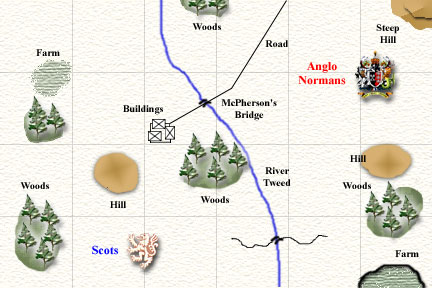
Two Councils of War
McSasix had taken a look at the terrain and realised that the English were closer to the bridge than his own men were, putting him at a disadvantage. What he did have was favourable terrain. The river tweed ran North-South, splitting the ground in two. Two bridges one of them the famed McPherson's bridge and the other which was closer to the Scots, went across. A hill and a forest left very little open ground on the Scots left and centre. Another hill and woods lined the right flank. But McSasix was worried about the right flank all the same where a large stretch of open ground between the river and the hill and woods extended all the way to the English camp. On the English side was an old farm dotted by a few wooden shacks. A small clump of trees stood near the English camp. Otherwise, the field was as plain and wide open on the English half as the cavalry could have wanted.
McSasix then turned to his fellow general David Ahearn. "David, pick as many spearmen as you want. Gregory" - this was Galwegian Gregory Tavish who doubled as the quartermaster - "will get you the mules you need to mount them. Start now, and take them on a wide sweeping march to the West. I want you to come up near the English rear tomorrow." Ahearn was not pleased but did not say anything. Though his name meant "Lord of horses" Ahearn could never handle a horse, donkey or mule comfortably and dreaded leading a whole lot of them on a march in this strange place. McSasix failed to take notice his companion's uneasiness. He continued with vigour "Gregory and his Galwegians will occupy the woods and await orders to charge. Stewart can hold the left with his spearmen and Thegns. I will be in charge on the right. I intend to pack as many long spear carriers as possible in between the river and the forest on the right. Hopefully we will be able to contain the English charge there."
"Recall all your scouts. We need what light cavalry we have on the flanks. Once the English charges fail we will unleash our own men". This was classic McSasix. "Every bit his father" thought Gregory Tavish. He sighed. "Hope that the son fares better than the father did". He had good reason to think thus. Sasix Senior 'The Sasacas' had been killed in the final cavalry charge of the Battle of York.
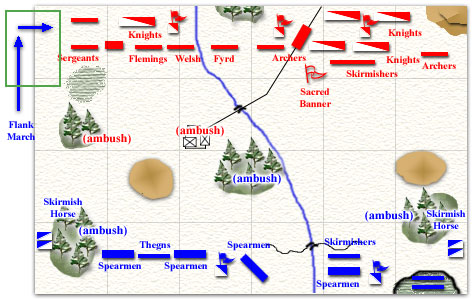
Sir Manubal surveyed the battlefield with displeasure. He had been assured by his guide that this was the best possible ground for massed cavalry charges that could be found around Berwick. "If this is your best open ground, I wonder what the less open places are like!" The guide flinched at the acidic comment but remained silent. The Scots had all the tree cover they needed. His right flank was virtually off limits for the cavalry. The river added to the trouble by splitting the battlefield in two. Any movement between flanks would be near to impossible. Grinding his teeth, Manubal decide upon a plan. "All right. Put the Knights on the left flank. Oh well, not all of them. Ramesh, take six hundred of them and hold as a reserve in the right flank. Spread the archers across. Put some in the woods on the right and those buildings in the centre. They can soften the Scots up before they close. I'll ride with the pennant in the left."
![]() By Bartholomew! That is hardly a plan! ... I don't care how much gold it costs me but the next time *I* will be in command!"
By Bartholomew! That is hardly a plan! ... I don't care how much gold it costs me but the next time *I* will be in command!"
![]()
A few seconds of silence followed after Manubal finished. Ramesh finally broke the silence and ventured a question "Sir Manubal, err, the plan would be...?" Manubal answered the question with a mild sneer. "The plan dear Ramesh, is to charge the enemy after softening him up. Our archers go ahead to seize the column and the army advances to meet the foe." Ramesh seemed to agree but Sir Harold, Manubal's third commander was taken aback. "By Bartholomew! That is hardly a plan!" He started to speak but the party was already moving along. Sir Harold checked his temper and followed. "I don't care how much gold it costs me but the next time *I* will be in command!"
As the august body fumed and cursed Sir Manubal was talking to Reverend Joseph Raymond, parish priest in Leicester and official guardian of Bartholomew's Banner. The banner was church property after all. "Father, I cannot express my gratitude to have you with me here today." Rev. Raymond looked around at the assembling troops with trepidation. In his fairly long service as vicar he had never been anywhere near a battlefield. "May I ask one more trivial favour out of your holiness?" Raymond bowed. "Anything you say Sire." The poor man did not have the slightest idea of what Manubal required of him. "As the carrier of the Holy Banner" Manubal automatically crossed himself as he spoke "you are required to ride with my Knights, so that the Holy Lord through his noble Saint Bartholomew will watch upon us and guide us in the battle." Rev. Raymond was mortified. "Ride with the Knights in to *battle*?" "But Sir Manubal, I am not a man of arms. My mission is to seek peace in the Lord, not wage war." Sir Manubal shook his head at the protest. "Tut ! Tut! Your holiness has misunderstood me. Leave the fighting to my men! You shall not even lift a dagger. All I ask is that you ride with them and fire their morale". The reverend tried to argue further, but the wily General tactfully got his way.
After he left Manubal Father Raymond sat gloomily in his tent wondering about the morrow. Kneeling in a prayer, he repeated the verses which he had chanted before in church but with a new understanding and feeling "...though I walk through the valley of the shadow of death, I will fear no evil: for thou art with me; thy rod and thy staff they comfort me. Yes, The Lord is my shepherd; I shall not fear".
![]() You surprise me, reverend. But that is as well; A brave priest than a meek one any day
You surprise me, reverend. But that is as well; A brave priest than a meek one any day
![]()
'Hostilities have commenced'
When the new day dawned Father Raymond was still in his prayers. Towards mid morning Michael Tarry, Manubal's squire came to fetch the Priest. Tarry found Father Raymond composed, almost solemn. The priest had even put on a shirt of mail. Holding his head high the vicar emerged with the blood red Banner of Bartholomew in his hand, the pennant fluttering in the wind. Tarry quietly followed behind. A silence fell when the pair walked across to where the Knights were assembling. Many of the older Knights drew the cross. All of them raised their lances and cheered mightily. "Bar-the-lomew! Bar-the-lomew! We shall win!!"
Sir Manubal emerged from his command tent hearing the tumult in the camp. He was surprised to see a resolute looking Father Raymond mounting a horse and trot towards the command tent. The Knights were still cheering. Apparently Reverend Raymond had become popular figure in an instant. "Sir Manubal, I present myself as you had instructed". Manubal smiled. "You surprise me, reverend. But that is as well; A brave priest than a meek one any day".
And so it was that when the English army moved out, the Banner of Bartholomew and its bearer were almost in the very front, flanked on both sides by the best of Knights. The whole army banged their weapons as they fell into place. At the first order, the orderly column of Archers deployed in column jogged along the road and headed straight for McPherson's bridge. On their left the entire left flank of the army surged forward. As London courtiers would have said "Hostilities have commenced".
The first thing which Sarath McSasix noticed was the red banner. To his consternation the banner was moving with the English Knights. The horsemen were a difficult foe at the best of the times; the presence of the relic would give them iron wills to stand their ground against odds as well. Even more alarming was the way in which the English archers jogged for the bridge. Suddenly his own troops seemed inadequate. McSasix quickly took some decisions. "Get those Spearmen here! No don't form up in column, just march as you are". Across river tweed men started moving in response to their commander. The warriors hefted their long spears and stepped into the river Tweed.
On the Scot extreme right the Scot cavalry began to advance. Some diversion on the flanks was on its way. On the Scot left the Thegns and spearmen under Stewart Duncan began to march with purpose as well. They had to gain the peak of the hill dead ahead before the English.
![]() The b*****ds! The horse killing, cheese eating land lubbers! This will teach you not to touch Timothy McFarlane's horse! Chaaarge!
The b*****ds! The horse killing, cheese eating land lubbers! This will teach you not to touch Timothy McFarlane's horse! Chaaarge!
![]()
McSasix watched as his light cavalry made good progress in the right. They rode past the hill and came face to face with more archers on the English left. Leader of the horsemen was one Timothy McFarlane, a headstrong local captain. His orders were to "harass and annoy" the enemy. Did the present situation warrant "harassment"? Turning back, McFarlane saw McSasix wave a flag in a confirmation to go ahead. Excellent. The horsemen lifted their javelins, aimed their horses at the archers and charged.
Their intended prey immediately checked their march. A shouted order brought four hundred arrows to the bows in an instant. By the time the Scots gained range and wheeled to fire and flee, the archers were waiting. "Fireeee!!!" shouted the leaders from both sides.
As his animal charged past the foe amidst the shower of arrows and javelins McFarlane could see men fall on both sides. His own horse was hit but somehow kept running. The Scots galloped back to their position and waited while the leader took stock. Out of arrow range, McFarlane was forced to dismount when his mount finally keeled over. His men watched with alarm as the sight of the dead animal sent their leader into a paroxysm of curses and oaths. McFarlane turned to the nearest trooper and shouted for him to dismount. As the shaken man got down McFarlane mounted his horse and rode forward. "The b*****ds! The horse killing, cheese eating land lubbers! This will teach you not to touch Timothy McFarlane's horse! Chaaarge!"
McSasix returned his attention to his cavalry a few minutes later. To his horror, they were in full gallop - and did not seem to stop. "Stop you fools!!" The shout did not carry, not that any orders would have been heeded. The noise of lines meeting each other echoed faintly back and the sight of men in melee was obscured in a swirl of dust kicked up by the horses and men. Soon figures began to emerge from the cloud of dust. McSasix did not need to notice that fleeing men were mounted to realise the outcome of the charge. Rout of the cavaliers was a foregone conclusion.
When the dust settled English archers became visible again. They were cooly wiping the blood from their short swords and daggers and moving forward. They seemed not to notice even their fallen.
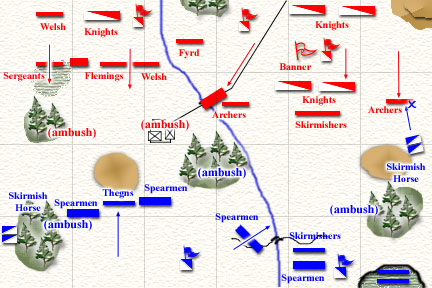
The Ambush that could not
The English left was mostly mounted troops and McSasix had expected them to advance fast. But what they did defied all his expectations. The enemy front line almost flew across the ground covering a hundred yards in a matter of minutes. With the dignified and solemn looking Reverend Raymond with them and commanded by Sir Manubal himself the Knights were not losing a single moment in their eagerness to give battle. Taking confidence from the mounted troops the English Archers followed suit. Reaching the bridge the archers disbanded column and formed up in a line. In an instant stakes were placed and the unit in a defensive stance. McPherson's bridge had been grabbed by the swift English fist.
The taking of the bridge received interesting reactions from both sides. Sir Manubal smiled. His men started marching faster, their vigour enhanced by the firm belief in the old legend about the bridge. Across the field, McSasix shrugged. He for one did not personally believe in the superstition. But his troops did and fell silent. On the left Stewart Duncan was alarmed. He promptly left his command position to consult his Thegns heedless of the fact that his men had ground to a halt at the base of the hill.
Inside the forest, Gregory Tavish and his Galwegians heard the cheers going up. Gregory's first reaction was to order his men to leave their positions and form up. It looked that the English were passing the forest. If so the men had to be prepared to charge...
The English were indeed passing near the forest. But to Gregory's astonishment, they turned out be on the wrong side of the River Tweed. Before anything could be done the ambush emerged and found find the English archers across the river notching arrows and taking aim right at them. At the distance, more archers shouted their support from - McPherson's bridge! Before the Galwegians recovered from the shock of seeing the vaunted bridge in enemy hands the arrows came flying. And kept coming. The forest cover stopped many arrows but not as many as the Scots would have wanted. The Galwegians took to heels. Gregory Tavish went flying right after them hoping to stop them in time. But it was not to be. By the time Tavish caught up with his men, they were out of the forest and near the Scot camp. By the time they were rallied, there was no need for their services.
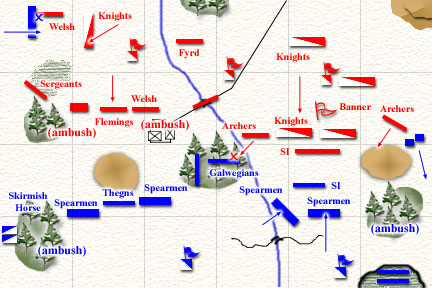
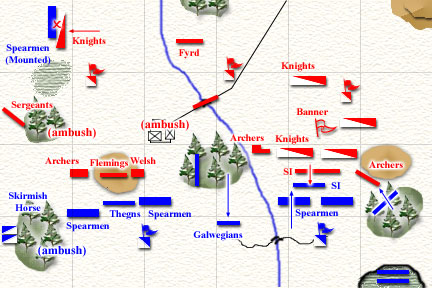
A flank march that almost was
McSasix watched the sun climbed higher with growing alarm. There was no sign of David Ahearn and his flank marchers. Almost all of them were mounted and should have reached the battlefield some time back. The bridge was gone, the English army was heading inexorably towards them and still no sign of them. "Where the Hell is David?"
David "Lord of the horses" Ahearn was in a veritable hell. He and his bodyguards had got separated from the rest of the flank marchers in the dawn fog. They had been wandering hopelessly for the past two hours. No sight, not even any sings of troops. "Blasted mules!" muttered Ahearn. The one he was riding was getting more and more stubborn by the minute and he had to to coax, force and plead with it in turns to get any sort of movement. They did not have any spare mules so he had to contend with the one he had. "Why did I ever agree to lead the march in this Godforsaken place?!" He swayed in his saddle as the mule negotiated the rough track. "Straight, you cursed animal! Go *straight*!"
Some of Ahearn's were having had better luck. Among the ranks of the five hundred or so mounted spearmen were a few adventurers from Berwick itself. Ahearn had not even bothered asking for such lowly peasants as guides, but to these spearmen the adventurers were just fellow companions who knew the land. They waited for the General for a while and not seeing him or his guards, ventured on to the battlefield...
...and emerged from a smooth hill right on the extreme right flank of the English Army. Directly in their path stood a group of Welsh Spearmen, facing south and thereby presenting open flanks. A juicy, easy, irresistible target. The Scots charged.
In the English ranks Sir Ramesh was interestingly the first to hear the rumble of charging mules. He swiveled his head and watched dazed as the Scot mule charge tore into the flanks of the Welsh spearmen. Caught off guard, the Welshmen froze and did not even begin to put up a fight. Before anyone else in the English arm could react, they were annihilated to the last man. The joyous Scots checked their mules and formed up looking for their next target. Straight ahead, there stood another unit, again presenting flanks. They seemed to be mounted, but so what? Yet another charge developed...
"Yet another mounted unit" turned out to be four hundred bodyguard Knights from Leicester Hall, as good at riding their horses as they were at fighting. Without even requiring Ramesh to give them orders, they smoothly wheeled to their right and presented a single unbroken line of lances to their foes. Shields went up in anticipation of the impact. There was not any. The Scots checked their advance yet again when the glinting lances came into view. Their battle frenzy evaporated even as that of the Knights started bubbling. Before the order to dismount could be given to any of the Scots the Knights launched their charge.
The local adventurers were the first to flee, they left the ranks even before the Knights started their gallop. The rest were either not so lucky or not so audacious; they took the charge still mounted, standing. One lance per Knight was all it took. By the time the rearing horsemen came to a halt over the strewn dead bodies of men and mules, hardly fifty of the five hundred Scots were alive. And those fifty were fleeing as fast as their mules or feet could take them. Sir Ramesh smiled. The flank was secure. His Knights had done well. The welsh fools were intended as spear fodder so no worries in that respect as well. Good.
![]() By God, Ye lads missed the scene. We ran at them, and them English chicken p****d where they stood and fled for their lives! We were rollin' on the field. They weren't no warriors!
By God, Ye lads missed the scene. We ran at them, and them English chicken p****d where they stood and fled for their lives! We were rollin' on the field. They weren't no warriors!
![]()
A Galwegian catalyst
Sir Manubal was feeling elated. Runners were streaming in from various corners of the English line up and all of them bore good news without exception. The right flank was secure, reported Sir Ramesh. The Flemings, excellent mercenaries all of them, had led the advance on the right and had just gained the heights in the right flank. They reported several hundred Scots standing at the base of the hill, merely watching. Manubal himself could see that the centre under Sir Harold and the left under his own command were doing well. The Knights sent their felicitations, as did the archers and the sergeants. "Why worry?"
In contrast the commander of the Scots was getting really worried. McSasix was getting a bad feeling about the archers and the skirmishers approaching his right flank. They were firing at steady intervals, and his spearmen, even when huddled behind their raised shields were losing men without a fight. His own paltry skirmish screen was in place but they were no match for the English in numbers. To top it all David Ahearn and his men were lost for ever. Fortunately for McSasix very few in the army had caught seen the the disastrous way the flank march had turned out. The moment the news spreads, we are in trouble. McSasix scratched his head violently. "What can I do???"
The impetus for his actions came from sir Manubal. After a few moments thought, he ordered the archers on his left flank - the very same people who had routed the Scot cavalry - to take the hill. The order had but to be received to be acted upon. Exhilarated by their own success and by the presence of the flank support the archers climbed the hill at the double, and sent back of orders. Manubal smiled at their enthusiasm. He was in an indulgent mood as well. Too indulgent for good for his own good.
The next order to the archers asked them to ignore the woods facing them, wheel, and move down hill - with their flanks open to the forest. Yet again, the men took up their weapons and jogged. Downhill, past the forest.
And the forest came alive. A heart stopping war cry sounded and hundreds of ferocious axe men broke cover and charged right onto the flanks of the archers. They did not have to fight; as they joked later with others: "By God, Ye lads missed the scene. We ran at them, and them English chicken p****d where they stood and fled for their lives! We were rollin' on the field. They weren't no warriors!"
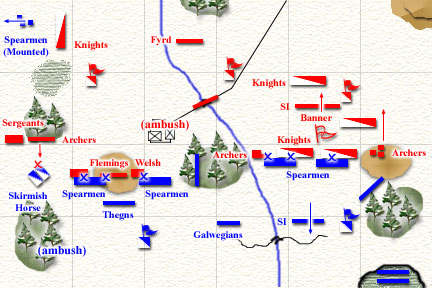
The Last Squire
The charge of the ambushers may not have made contact but their opponents had certainly taken flight. More importantly, it broke the lethargy and sent the events into a frenzy. McSasix was the first to react. Watching the ambush roll out he threw all caution to wind. He had nearly two thousand spearmen under his command alone. If they couldn't do the task, and do it now, then nobody could. Riding to the front lines, McSasix shouted out the orders to charge.
A sea of long spears surged forward in an orderly fashion. Watching the juggernaut advance the skirmishers in the strip of land separating the two sides scattered, their minor engagements forgotten. Taking cue from his commander in chief, Stewart Duncan ordered a charge on the left flank. The entire Scot front line was in motion in a wave of spear points heading for an English shore.
On the English side, the advance took the men and their commanders alike by surprise. The Knights were anxious for a moment but it passed. Father Raymond led his horse forward and held the Banner of Bartholomew high for everybody's benefit. Accompanying the vicar, Michael Tarry noted that his companion had dispelled any fears that might have been there.
This was the sight which the Scots saw as they closed in, the red banner waving in the background as the lances glinted in the foreground and arrows flew. But their advance could not be checked and the charge rammed home. The Knights managed to mount a counter charge, but failed to develop their momentum for lack of room to run up their horses.
Standing near the front line, yet not affected by the charge, squire Michael Tarry had the best vantage position. He would never forget that feeling. There were no men to be seen at first; only a sea of spears as far as he could see, much like a huge hedgehog. The horses seemed small compared to the forest which assailed them. The riders, the stout fearless Knights whom Tarry had come to admire for their valour and skills, were tossed from their mounts and trodden beneath the marching, stamping feet of the Scotsmen. Knight after Knight suffered the same fate until it seemed that no one in the first two lines were left alive. The rest put up a brave fight, but the sheer strain of holding against such a massive push was overwhelming. Tears welled in his eyes. Here was the flower of chivalry being ruthlessly churned into the mud by mere shirtless peasants! Woe! He could stand it no longer. Asking Reverend to pray for him, Tarry drew his sword,. and galloped into the thick of the melee. The last the priest saw of him was as his horse cleared the obstacles of dead horses and men and entered the fray. Neither horse nor rider were seen alive again. Father Raymond mutely recited a prayer for the souls of the slain.
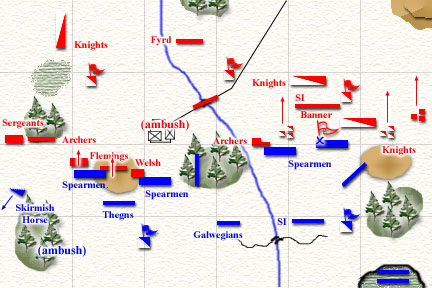
May thy belief save thee
Sir Manubal was too far away to be of use in the action. With his heart in his mouth the Englishman hurried across to where the action was. Atop the hill on his right flank the Flemings were fighting a losing battle against the long spearmen. Though hardy fighters, the mercenaries just could not match the numbers of the Scots. They gave way, and the hill was soon swarming with Scotsmen. The archers accompanying the Flemings fell back and yelled for support. There was none to be had.
Alarmed, he looked to his left in the hope that the Knights would have fared better. But the sight of the fleeing cavaliers and riderless horses told the tale. The Scot aggressors were in good order and seemed to be in a bloodthirsty delirium. As he watched horror struck, the thin line of mounted mail which stood between him and the oncoming Scots fell. The men were broken and bloody and fleeing. And standing in the heart of the chaos all alone was the His holiness Reverend Joseph Raymond, bearer of Bartholomew's banner. The Scots were headed for the banner with enormous grins on their faces. Manubal fainted.
![]() The English bleed! The lion of Scotland has roared again! And! Berwick upon tweed is mine!!!
The English bleed! The lion of Scotland has roared again! And! Berwick upon tweed is mine!!!
![]()
It was thus that the Scots found the banner, held high by strange Englishman whose cassock and neck chain with a crucifix on it were visible beneath his mail. The leader of the spearmen approached the priest. "Preaching war eh?" The priest remained silent. "Well, reverend, the Kingdom has come! You will please hand over the Banner to the man here." Father Raymond stood motionless. The Scot captain was getting angry. "Now d'd ya hear what I said? Hand over the banner or.." Luckily for Raymond McSasix galloped the scene before the Scotsman could have his way. "Adair! Get moving! lead your men forward!"
When the spearmen started moving again, McSasix looked quizzically at the strange priest. He was surprised when the man handed over the banner almost offhandedly. Looking at the General, Raymond spoke in sepulchral tones "I do not need this any more. May it serve you better, my son."
"What did he mean?" wondered a puzzled McSasix. But this was hardly the time for pondering spiritual sayings. Ignoring the man who was by now kneeling in the ground with his head bowed, McSasix hefted the Banner high in his hand and forward. The Scots were pressing ahead on all fronts and the English were fleeing in terror at the sight of the banner in the hands of the enemy General. McSasix let out a yell. "The English bleed! The lion of Scotland has roared again! And! Berwick upon tweed is mine!!!"
Epilogue
An unconscious Manubal was carried off the field by some loyal retainers. He returned to Leicester a broken man and spent the rest of his life quietly inside the house of his fathers. A rather happy Sir Harold replaced him as commander of armies. In the absence of his friend Sir Ramesh chose to opt for a political career instead. With this purpose he moved to London. Devious battles of court awaited him.
Sarath McSasix became the Duke of Berwick Upon Tweed. In a stroke his fortunes were reversed. A seat in the high council at Aberdeen was not far away.
David Ahearn finally turned up in an English village a week after the battle. He was captured by the English and hanged publicly. The mule which bore him was kept in the village as a local curiosity where it lived until the end of the years.
And Father Raymond? The vicar never returned to the diocese after the battle. People around the border speak of a strange travelling priest who visits villages and plays with children, telling them stories from lore. And whatever the story he would always end his narration with a prayer to God.
- Credits
-
Players: Madhav G.S. (Sir Manubal), Sarath Sasikumar (Sarath McSasix) ; Umpire and Reporter: Manoj E. Govindan ; Rules Used: House rules based on Medieval Warfare by Terry Gore and Piquet/Band of Brothers by Bob Jones ; Poem: Thanks to North East England History Pages for putting up that small poem about Berwick Upon Tweed online.